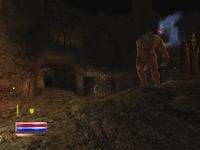| |
Site Navigation
Main
News
Forums
Games
Games Database
Top 100
Release List
Support Files
Features
Reviews
Previews
Interviews
Editorials
Diaries
Misc
Download
Gallery
Music
Screenshots
Videos
Miscellaneous
Staff Members
Privacy Statement
|
|
Chuck Yager has done one of his Pool of Radiance essays over at the official WOTC site. He's talking about the game development, and entitlkes his essay "The End in Sight":
It's been a long road and one that I have been very happy to travel down, but the end is finally near for my work on Pool of Radiance: Ruins of Myth Drannor. The game is set to release September 25, and you'll finally be able to experience it for yourself. My topic this month is simply to vent about the process and allow for a forum in which I can gain a sense of closure. Just kidding! However, I would like to share a bit of the process with you from way back in 1999, when I started on the project, until now.
Turning the sands of time backwards to May 1999, I can remember when I first laid eyes on the early prototype version of the Electronic Entertainment Expo demo of Pool of Radiance: Ruins of Myth Drannor. Excitement coursed through my veins as I realized, after weeks of Jon Kromrey (then producer of the product and my mentor) reassuring me that I wasn't dreaming, that I would get the chance to make a great RPG video game. A dream come true for me! However, as most of you know, dreams take a lot of work to fulfill and Pool was no exception. At first, it was mostly paperwork, meetings, and errands for me . . . not a whole lot of design time or face-to-face with the developer. But as the weeks rolled into months, I found that all changed.
I was able to meet many talented and focused individuals at Stormfront Studios with whom I soon developed friendships. I was also included in fundamental design meetings that gave way to decisions like including the paladin (I credit Jon with that) and the monk (mine) character classes, as well as adding new spells and developing a skill and feat list that would both work with the code and still be useful in the game. Along the way we had to make hard choices about what would be kept and what could not be done in the development time we had left (which has significantly changed since the early days). |
|
|





 Pool of Radiance Essay
Pool of Radiance Essay